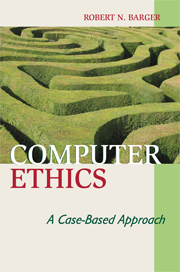Book contents
- Frontmatter
- Contents
- Preface
- Acknowledgments
- 1 Introduction
- 2 The Computer as a Humanizing Agent
- 3 Philosophic Belief Systems
- 4 A Philosophic Inventory
- 5 The Possibility of a Unifying Ethical Theory
- 6 The Ethical Decision-Making Process
- 7 Psychology and Computer Ethics
- 8 The Computing Field as a Profession
- 9 Computer-Related Codes of Ethics
- 10 Computer Ethics and International Development
- 11 Robotics and Ethics
- 12 Theft and Piracy Concerns
- 13 Cases Concerning Theft and Piracy
- 14 Privacy Concerns
- 15 Cases Concerning Privacy
- 16 Power Concerns
- 17 Cases Concerning Power
- 18 A Miscellaneous Collection of Cases
- 19 Parasitic Computing Case
- Appendix: Topics for Presentations, Discussions, and Papers
- Notes
- Selected Bibliography
- Index
16 - Power Concerns
Published online by Cambridge University Press: 05 June 2012
- Frontmatter
- Contents
- Preface
- Acknowledgments
- 1 Introduction
- 2 The Computer as a Humanizing Agent
- 3 Philosophic Belief Systems
- 4 A Philosophic Inventory
- 5 The Possibility of a Unifying Ethical Theory
- 6 The Ethical Decision-Making Process
- 7 Psychology and Computer Ethics
- 8 The Computing Field as a Profession
- 9 Computer-Related Codes of Ethics
- 10 Computer Ethics and International Development
- 11 Robotics and Ethics
- 12 Theft and Piracy Concerns
- 13 Cases Concerning Theft and Piracy
- 14 Privacy Concerns
- 15 Cases Concerning Privacy
- 16 Power Concerns
- 17 Cases Concerning Power
- 18 A Miscellaneous Collection of Cases
- 19 Parasitic Computing Case
- Appendix: Topics for Presentations, Discussions, and Papers
- Notes
- Selected Bibliography
- Index
Summary
Introduction
Having spoken in Chapter 12 about theft and piracy concerns and in Chapter 14 about privacy concerns, it will be the task of this chapter to cover power concerns. “Power concerns” might sound like a catchall for any issues left over after those covered in Chapters 12 and 14. In a sense, this is the case. However, the choice of the term “power” is meant to focus more specifically upon ethical dilemmas involving the use of power or involving subjection to power.
Accountability of Bloggers
The Merriam-Webster Online Dictionary defines “blog” as “a Web site that contains an online personal journal with reflections, comments, and sometimes hyperlinks provided by the writer.” The question of accountability has been raised in regard to blogging in as much as blogs are essentially public materials, intended for all to see, and meant as media to publicize the thoughts, feelings, and opinions of the blogger. If the press is to be held accountable for its reporting, should not bloggers also be held accountable for what they publish?
In 2005, a blogger was given press credentials for admission to the White House briefing room. The same New York Times story that reported this event continued by saying: “Increasingly, bloggers are penetrating the preserves of the mainstream news media. They have secured seats on campaign planes, at political conventions and in presidential debates, and have become a driving force in news events themselves.”
Information
- Type
- Chapter
- Information
- Computer EthicsA Case-based Approach, pp. 197 - 206Publisher: Cambridge University PressPrint publication year: 2008
